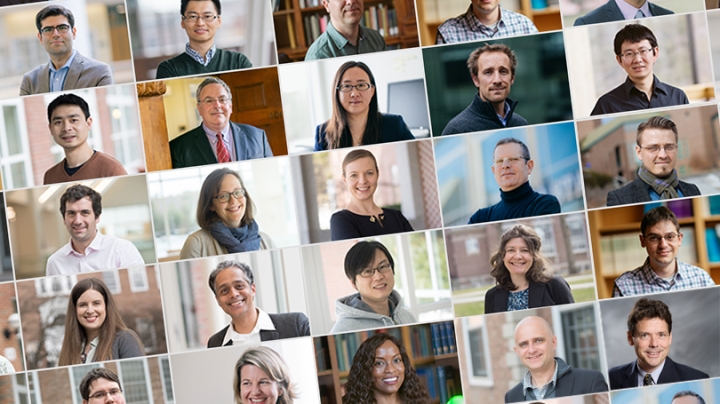Thirty-two scholars started teaching at Dartmouth this academic year. Many are researching solutions to challenging problems in medicine, business, and the arts and sciences.
Boundaries are starting to blur among these traditionally distinct fields of study, and that’s good, say the new professors, who are conducting groundbreaking, multidisciplinary research and bringing their discoveries back to their classrooms.
“Our talented new faculty come to Dartmouth from a wide range of disciplines and nationalities, and they bring a collaborative spirit and practice into our classrooms. All are committed to the power of the liberal arts and to advancing knowledge in innovative ways,” says Michael Mastanduno, dean of the Faculty of Arts and Sciences and the Nelson A. Rockefeller Professor of Government.
Several researchers who have come to Dartmouth this year are focusing on health care. Anne Hoen, an assistant professor of epidemiology and of biomedical data science at the Geisel School of Medicine, uses statistics and population genetics to predict the risk of disease, especially among children. At Thayer School of Engineering, Assistant Professor of Engineering Geoffrey Luke studies ultrasound, optics, and nanotechnology with the aim of improving the process of cancer diagnosis. Darlene Drummond, an assistant professor of speech at the Institute for Writing and Rhetoric, researches how people talk about being sick—how they communicate the experience of having chronic illnesses such as obesity, diabetes, hypertension, and cancer.
Many new faculty members bring with them a global perspective. Devin Singh, an assistant professor of religion, comes from a multi-ethnic family that moved to different parts of the world as he grew up. When he was a child, his Cameroon home was bombed (as collateral damage) in an attempted coup d’état. He has visited medinas and mosques in Morocco, Sikh gurdwaras in Punjab, and post-soviet-bloc complexes in Romania. “I am interested in how the framework of religion is helpful in understanding the influence of money in economy and society,” he says.
Worldwide travel has also been key to the work of Jeremy DeSilva, an associate professor of anthropology. He and his collaborators made international headlines last fall when the news broke about their discovery of more than 1,600 fossils of a new human ancestor in Rising Star Cave in South Africa. “Dartmouth is a perfect fit for me,” DeSilva says. “I am thrilled to be part of a community that values and integrates teaching and research both inside and outside the classroom.”
Another globetrotter to join the faculty is Assistant Professor of Art History Chad Elias, whose research examines artistic practices in contemporary Lebanon. “I am interested in the social and political roles assigned to images in post-conflict settings,” he says. “What kind of truth claims are ascribed to photographic and video documents in the public realm, and to what extent can these media serve to convey violent and traumatic histories?”
Arts and sciences meet when Wojciech Jarosz, an assistant professor in computer science, seeks to “discover, understand, and model how the physical world works, while simultaneously empowering peoples’ creative abilities.” Jarosz is changing the look of special effects in animated films, finding “efficient and accurate ways to simulate light and clouds and fog in explosions.”
Digital technology—capturing neural data—also plays a role in the work of Jeremy Manning, an assistant professor of psychological and brain sciences. Manning studies the way human brains store information about their environment. “My lab studies the beautiful, complex, and dynamic brain processes that reflect how our memories influence how we perceive what’s happening now and what we predict what will happen next,” says Manning. “Imagine who you’d be if your memories were erased. Our memories make us who we are.”
The teaching scholars who joined the faculty this year come from a wide range of academic fields: history, sociology, religion, government, English, speech, theater, art history, anthropology, psychology, mathematics, computer science, music, biology, chemistry, biology, Asian and Middle Eastern languages and literatures, business, medicine, and engineering. And they arrive at an exciting time in Dartmouth’s history, as new residential settings—“living learning communities”—foster both social and academic growth, allowing students and faculty to get to know each other and share scholarly interests outside the classroom.
New faculty at Dartmouth, 2015-16
Arts and Sciences
- Jesse Casana, associate professor of anthropology
- Luke Chang, assistant professor of psychological and brain sciences
- Jeremy DeSilva, associate professor of anthropology
- Darlene Drummond, assistant professor of speech
- Chad Elias, associate professor of art history
- Feng Fu, assistant professor of mathematics
- Ashley Fure, assistant professor of music
- Michael Ganio, assistant professor of theater
- Bing He, assistant professor of biological sciences
- Wojciech Jarosz, assistant professor of computer science
- Chenfeng Ke, assistant professor of chemistry
- Andrew Levin, professor of economics
- Qiang Liu, assistant professor of computer science
- Jeremy Manning, assistant professor of psychological and brain sciences
- Katherine A. Mirica, assistant professor of chemistry
- Bethany Moreton, professor of history
- Kimberly B. Rogers, assistant professor of sociology
- Sachi Schmidt-Hori, assistant professor of Asian and Middle Eastern languages and literatures
- Devin Singh, assistant professor of religion
- Justin Strauss, assistant professor of Earth sciences
- Patricia Stuelke, assistant professor of English
- Sean Westwood, assistant professor of government
- Xing-Dong Yang, assistant professor of computer science
Geisel School of Medicine
- Saeed Hassanpour, assistant professor of biomedical data science
- Anne Hoen, assistant professor of epidemiology, assistant professor of biomedical data science
- Joshua Obar PhD ’06, assistant professor of microbiology and immunology
Thayer School of Engineering
- Amro Farid, associate professor of engineering
- Weiyang (Fiona) Li, assistant professor of engineering
- Geoffrey Luke, assistant professor of engineering
- Rahul Sarpeshkar, Thomas E. Kurtz Professor; professor of engineering, of microbiology and immunology, of physics, and of physiology and neurobiology
Tuck School of Business
- Laurens Debo, associate professor of business administration
- Gordon Phillips, C.V. Starr Foundation Professor; academic director, Center for Private Equity and Entrepreneurship
See slideshow on Dartmouth’s Flickr site.

